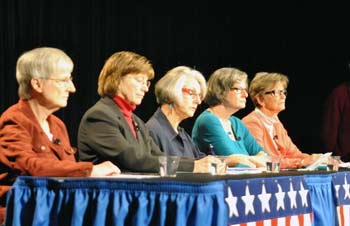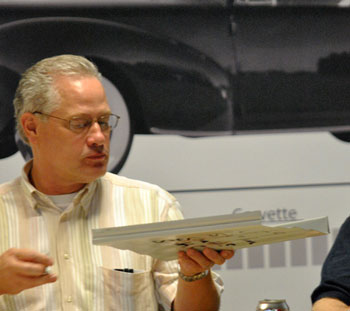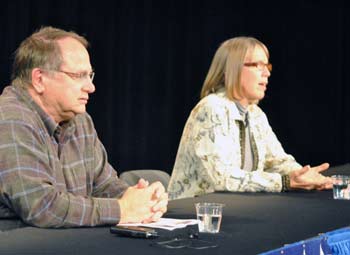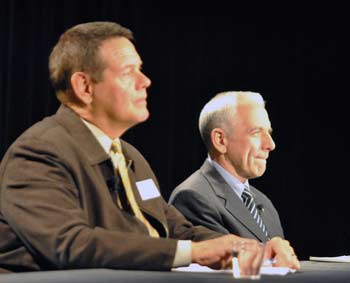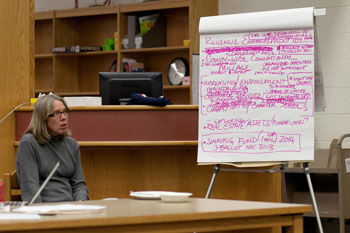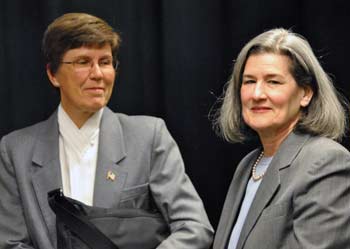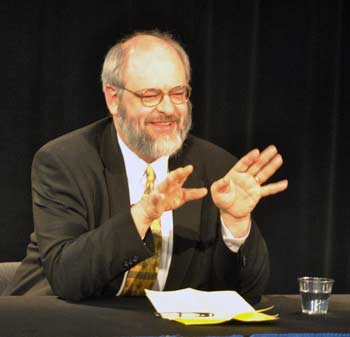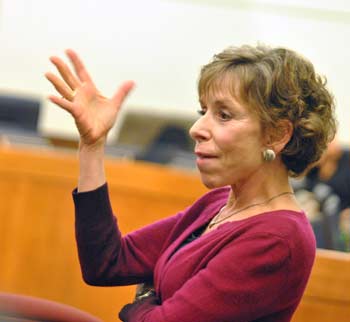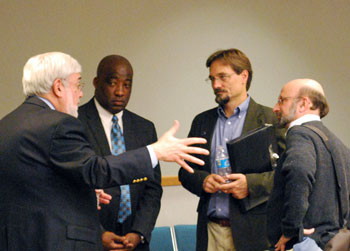Three-Way Race in State House 55th District
Voters in the 55th District of the Michigan house of representatives will have a choice of a Republican, a Green or a Democrat in the Nov. 6 general election: Owen Diaz, David McMahon and Adam Zemke. All three participated in an Oct. 11 candidate forum organized by the League of Women Voters of the Ann Arbor Area.
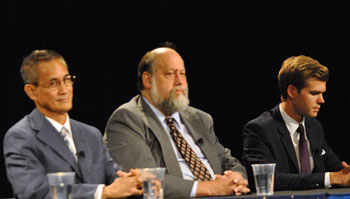
Left to right, candidates for the 55th District Michigan House of Representatives: Republican Owen Diaz, David McMahon of the Green Party, and Democrat Adam Zemke. (Photos by the writer.)
Questions from the LWV moderator covered basic biographical background, voter registration laws, partisanship, the state retirement system, and women’s reproductive health.
Diaz is former mayor of Milan, and stressed as a theme his plan to bring good jobs to Michigan and to retain recent graduates from Michigan schools. He was clear that he opposes abortion and favors one-man-one-woman marriage – but said those were the only issues that led him to identify more strongly with the Republican Party. He described political parties as useful for campaigning, but stated, ”My loyalty to the party ends where my loyalty to the voters of the people begins.”
McMahon currently serves on the board of the Lincoln Consolidated Schools district, and offered that perspective on the state’s reduction to education funding. The main difference between him and the other two candidates, he said, is not that his goals are somehow fundamentally different – but rather that he’ll bring a fire to his work as a legislator, based on his own experience, which includes having a home foreclosed on: ”I’m on steroids!”
Zemke stressed his ties to the area as a fifth generation Washtenaw County resident, saying he would take Washtenaw County values to Lansing. He contrasted himself with the other two candidates as a fresh face, and a member of a generation that has seen jobs leave the state – which has led many of his generation also to leave the state. He called the economy the most important issue we face and stressed how other issues are related to the economy – like adequate funding for education at all levels.
Zemke and Diaz have also given responses to three questions that are included on the league’s Vote411.org website.
There are no incumbents in this race for a two-year term. The current District 55 representative, Republican Rick Olson, decided not to seek re-election after redistricting altered the district’s political composition. District 55 covers parts of northern Ann Arbor, the townships of Ann Arbor, Augusta, Pittsfield and York, and a northern part of the city of Milan.
The Oct. 11 candidate forum was held at the studios of Community Television Network in Ann Arbor, and is available online via CTN’s video-on-demand service. Candidates for the 53rd District – Jeff Irwin and John Spizak – were also invited to participate, but Irwin was the only one who attended. His responses to LWV questions are reported in a separate Chronicle write-up.
Information on local elections can be found on the Washtenaw County clerk’s elections division website. To see a sample ballot for your precinct, visit the Secretary of State’s website. The league’s Vote411.org website also includes a range of information on national, state and local candidates and ballot issues, and a “build my ballot” feature. [Full Story]






